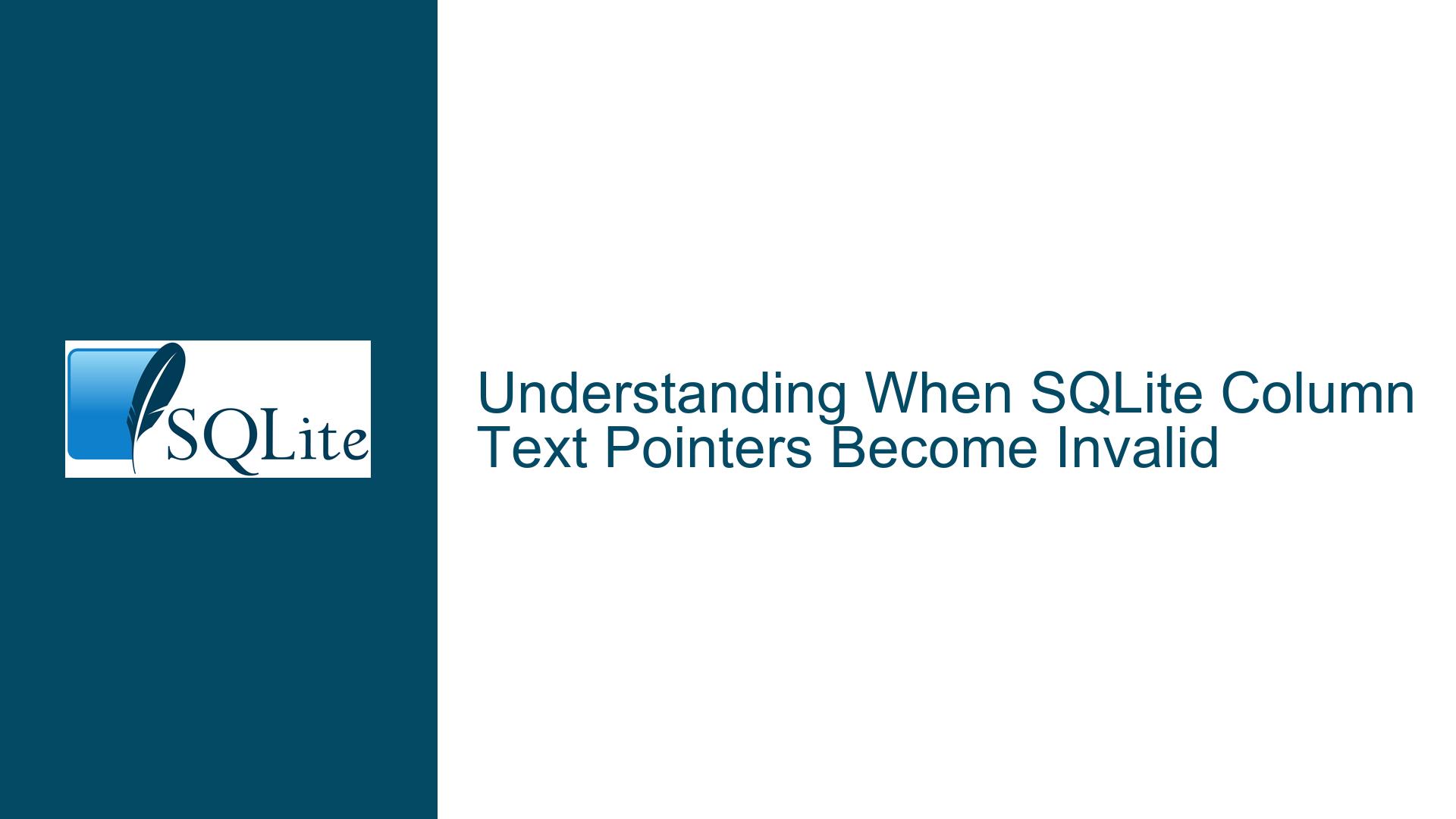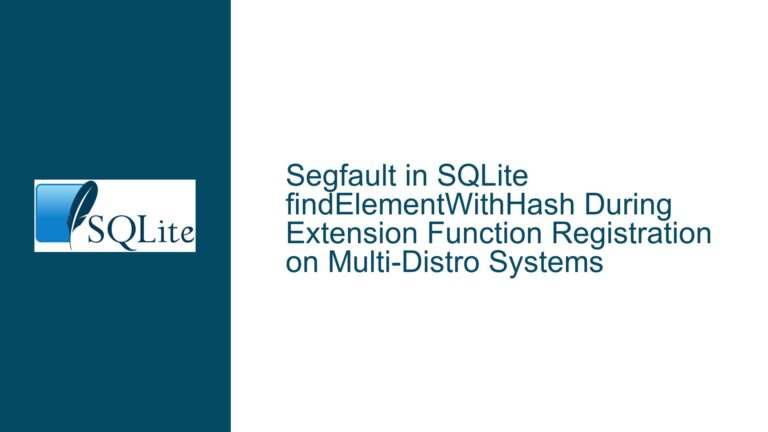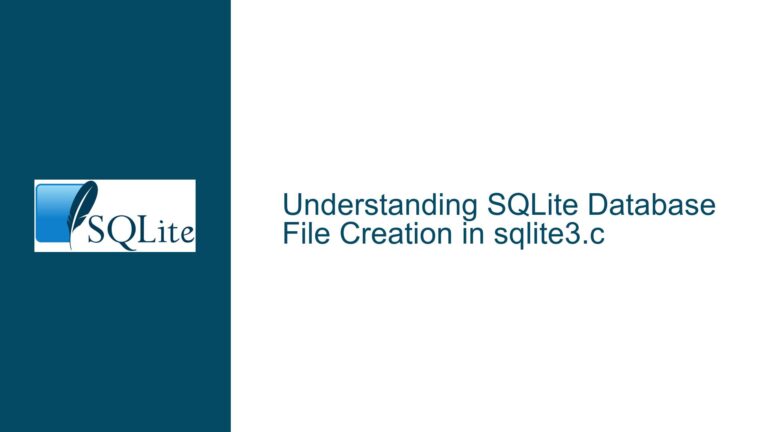When SQLite Column Text Pointers Become Invalid
Issue Overview: Validity of Column Text Pointers After Type Conversions
SQLite’s C/C++ interface provides functions like sqlite3_column_text() to retrieve column values as specific data types. These functions return pointers to memory locations where the data is stored. The SQLite documentation states that such pointers remain valid only until a type conversion occurs on the corresponding value. This raises critical questions about the scope of this invalidation: Does the pointer become invalid only when the same column’s value undergoes a conversion, or does any type conversion in the same row or statement affect it?
To resolve this, we must dissect SQLite’s internal handling of column values. SQLite uses dynamic typing, where the data type is a property of the value, not the column. When a value is retrieved using a data-specific accessor (e.g., sqlite3_column_text() for text or sqlite3_column_blob() for a BLOB), SQLite may implicitly convert the value to the requested type. For example, retrieving an integer as text forces a conversion of that integer to a string representation. This conversion modifies the underlying storage of the value, invalidating any prior pointer to it.
The critical nuance lies in which operations trigger invalidation. Suppose you retrieve a text pointer for Column A and then perform a type conversion on Column B. Does the pointer for Column A remain valid? The answer depends on whether the conversion affects Column A’s storage. SQLite manages each column’s value independently; converting Column B’s value does not alter Column A’s storage. Thus, the invalidation is value-specific, not row-wide or statement-wide.
However, if you retrieve a text pointer for Column A and later perform a type conversion on Column A itself (e.g., by calling sqlite3_column_blob() on the same column), the original text pointer becomes invalid. This is because the conversion alters the storage format of Column A’s value. Developers must track conversions at the per-value granularity, not per-row or per-statement.
Possible Causes: Misunderstanding Scope and Lifetime of Column Pointers
The confusion around pointer validity stems from three primary factors:
Ambiguity in Documentation Phrasing: The SQLite documentation states that pointers are invalidated “until a type conversion occurs,” but it does not explicitly clarify whether this refers to conversions on the same value, column, row, or statement. This ambiguity leads developers to overestimate the scope of invalidation, assuming it applies to any conversion in the same context.
Implicit Type Conversions: SQLite performs implicit conversions when accessing a value using a different data type than its original storage. For example, reading a BLOB as text (
sqlite3_column_text()) converts the BLOB to a UTF-8 string. If a developer reads the same column again as a BLOB (sqlite3_column_blob()), the original text pointer is invalidated. This behavior is not always intuitive, especially when multiple accessors are used on the same column.Lack of Isolation Between Column Operations: Developers might assume that operations on one column do not affect others. While this is true for most cases, certain operations, such as
sqlite3_column_bytes(), can indirectly trigger conversions. For instance, callingsqlite3_column_bytes()on a text value forces SQLite to compute the byte count, which does not invalidate the pointer. However, callingsqlite3_column_bytes()on a BLOB that was previously read as text could trigger a re-conversion, invalidating the text pointer.Misaligned Data Lifetime Expectations: Developers accustomed to databases with static typing or managed memory might expect pointers to remain valid for the duration of the transaction or statement. SQLite’s pointers, however, are tied to the current representation of the value, which can change with subsequent accessor calls.
Troubleshooting Steps, Solutions & Fixes: Ensuring Pointer Validity
To avoid dangling pointers and undefined behavior, follow these guidelines:
Understand the Lifetime of Pointers:
- A pointer returned by
sqlite3_column_*()is valid only until the next type conversion on the same column and row. For example:const unsigned char* text = sqlite3_column_text(stmt, 0); // Valid pointer int blob_size = sqlite3_column_bytes(stmt, 0); // Does NOT invalidate text const void* blob = sqlite3_column_blob(stmt, 0); // INVALIDATES text pointerHere, accessing the BLOB after the text pointer invalidates the text.
- A pointer returned by
Avoid Sequential Conversions on the Same Column:
If you need both text and BLOB representations of a column, copy the data immediately:const unsigned char* text = sqlite3_column_text(stmt, 0); char* text_copy = malloc(sqlite3_column_bytes(stmt, 0) + 1); memcpy(text_copy, text, sqlite3_column_bytes(stmt, 0) + 1); // Now safe to call sqlite3_column_blob(stmt, 0);Use SQLite’s Copy Functions:
Functions likesqlite3_column_text16()orsqlite3_column_blob()return pointers to transient buffers. For persistent use, employ SQLite’s built-in copy mechanisms:int bytes = sqlite3_column_bytes(stmt, 0); void* blob_copy = sqlite3_malloc(bytes); memcpy(blob_copy, sqlite3_column_blob(stmt, 0), bytes);Leverage Statement Lifetimes:
Pointers remain valid until the statement is reset (sqlite3_reset()) or finalized. If you need data beyond the statement’s lifetime, copy it before resetting.Debugging Dangling Pointers:
Enable SQLite’s runtime checks usingSQLITE_DEBUGandSQLITE_ENABLE_COLUMN_METADATAto track conversions. Monitor API calls to identify unintended type conversions.Prevent Implicit Conversions:
Store data in the format you intend to retrieve it. For example, store text asTEXTand binary data asBLOBto avoid UTF-8/16 conversions.
By adhering to these practices, developers can ensure the validity of column pointers and avoid memory-related errors in SQLite applications.






